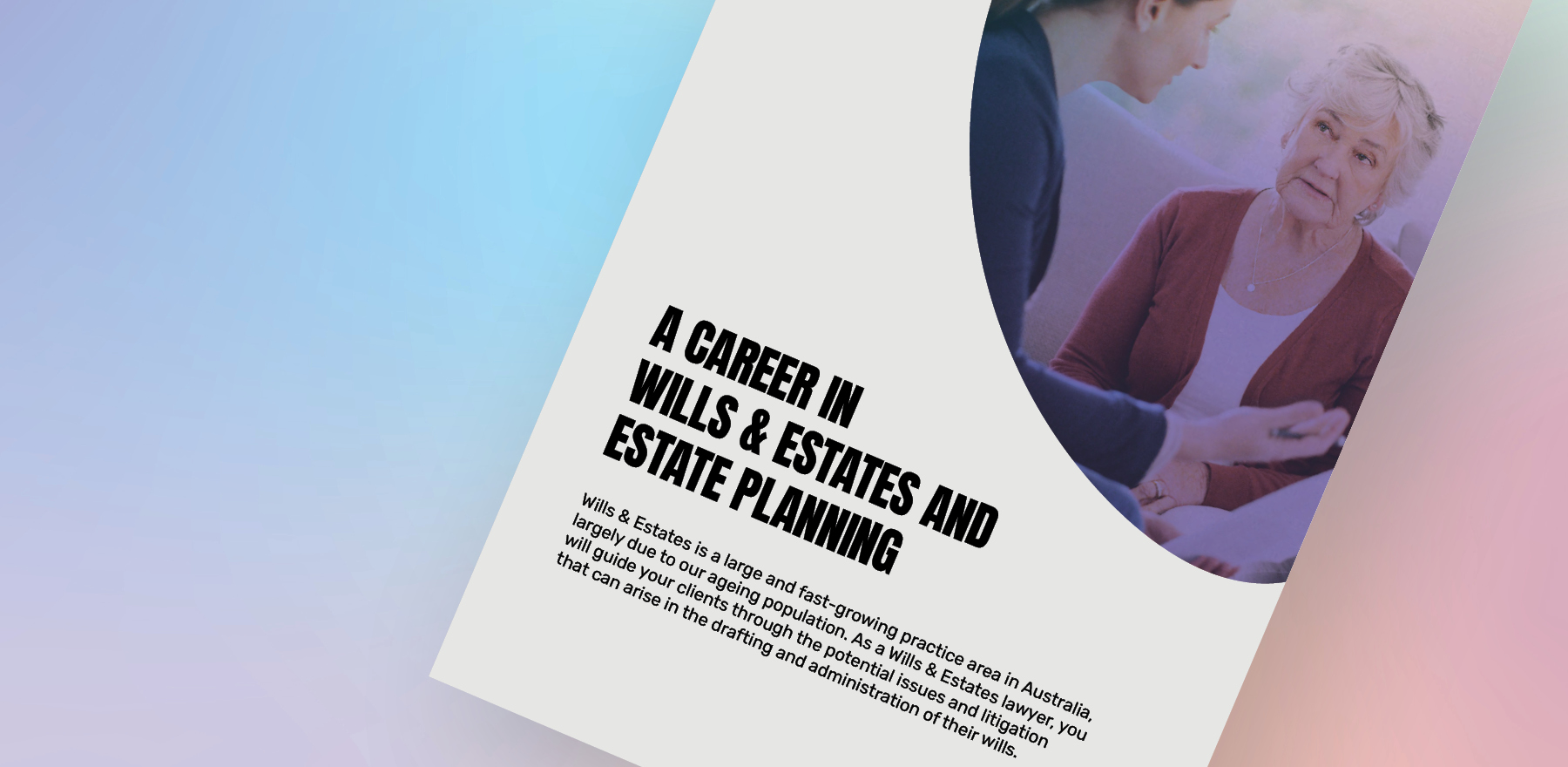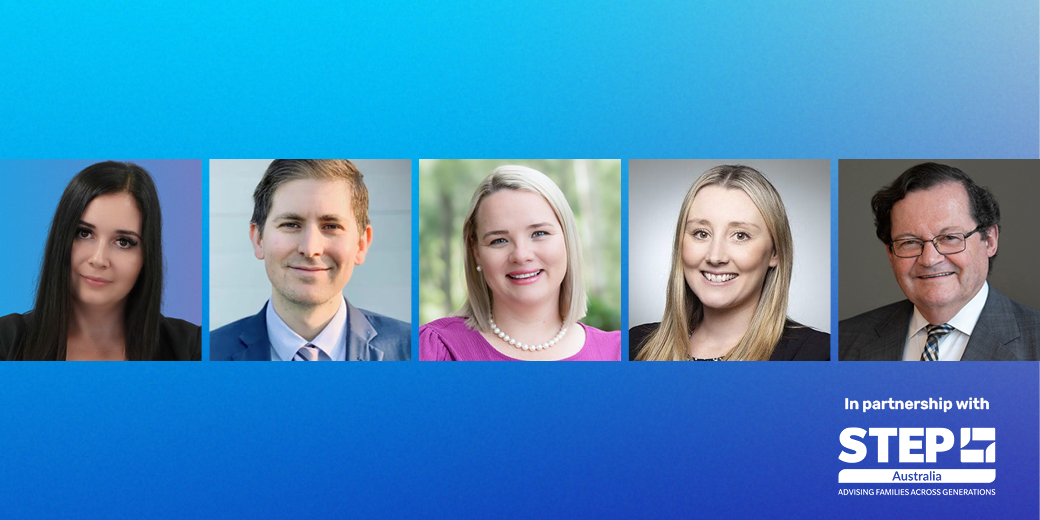A POSTGRADUATE QUALIFICATION GIVES YOU AN EDGE
The College of Law can help you expand on what you already know and acquire new knowledge while providing you with opportunities to hone your skills in a practice area, so that you stand out from the competition.
Open up new career pathways by studying a Graduate Certificate, Graduate Diploma or Master of Laws program. One that’s reality-based, balanced and world-renowned, so you can become the best version of yourself for your client, practice and community.
This is your chance to build career prospects, earn industry recognition, and boost your earning potential.
Curious about where your skills could take you next? Scroll down to explore the variety of practice areas, detailed course subjects, and potential awards waiting for you. Find your perfect fit and tailor your education to your career ambitions.
Intake 1, Starts 10 February 2025
PROGRAM OPTIONS - WILLS AND ESTATES
Graduate Certificate in Applied Law
2
Choose any two subjects in your chosen area
A recognised law degree (LLB, JD, or equivalent)
Approx 6 months
Graduate Diploma of Applied Law (Wills and Estates)
4
3 core subjects (WEP1, WEP2, WEP3) and 1 WEP elective subject
A recognised law degree (LLB, JD, or equivalent)
1 year part-time
Master of Laws (Applied Law) majoring in Wills and Estates
8
3 WEP subjects, 4 elective subjects or a second major and the Capstone project in Wills and Estates
A recognised law degree (LLB, JD, or equivalent)
2 years part-time
OR START WITH A GRADUATE CERTIFICATE
Take control of your career
If you decide later to progress towards a Masters, you’ll receive credit towards that award.
WILLS & ESTATES SUBJECTS
WEP00 - Capstone Project (Wills & Estates)
Intake 2, 4TOPICS
THE SUBJECT HAS FOUR COMPONENTS
- Four short answer questions
- Two legal writing samples
- Oral communication (e.g. client interview) assessment held through online conferencing
- Reflective analysis
WEP1 - Foundations of Wills & Estates Practice
Intake 1, 2, 3, 4TOPICS
- Testamentary contracts, mutual wills and estoppel
- Ethics, professional responsibility and liability
- Proof of death and burial
- Formal requirements and the dispensing power
- Taking instructions for and drafting wills
- Essential validity, including testamentary capacity
- Introduction to family provision
- Post-execution: alterations, codicils, republication, revocation and revival
WEP2 - Law and Practice of Estates
Intake 2, 4This subject covers the procedures and principles involved in the administration of estates. It identifies and enables students to apply the legislative provisions relating to testate and intestate estates. It covers the procedural steps for obtaining uncontested grants of probate and letters of administration, including taking client instructions and providing appropriate advice to the client. Students draft applications for grants of probate and letters of administration, as well as administer assets and wind up the estate.
On satisfactory completion of this subject students will understand fundamental theories and practices involved in administration of estates practice, and have an understanding of how to apply this knowledge in professional practice. Students will be able to use and explain this knowledge to specialist and non-specialist audiences. Using practice-based analytical and critical thinking skills, students will be able to apply this knowledge to problem-solving and decision-making in practice.
TOPICS
- Framework for estate administration applications
- Intestacy
- Administration without a grant, small estates and obtaining instructions for estate administration
- Applying for grants of probate and letters of administration and for resealing
- Asset collection, payment of debts and distribution
- Duties and liabilities of legal personal representatives and rights of beneficiaries
- Taxation matters, accounts and commission
- Costing estate matters and managing a wills and estates practice
WEP3 - Construing and Drafting Wills
Intake 1, 3TOPICS
- The court of construction and construction suits
- General principles of construction and construing gifts
- Specific rules of construction
- Admissibility of evidence in the construction of a will Issues in advising on estate planning
- Drafting issues - blended families
- Drafting issues – testamentary trusts and vulnerable beneficiaries
- Lapse of gifts and equitable ademption, satisfaction and election
WEP4 - Family Provision
Intake 2, 4TOPICS
- The family provision framework
- Approach of the court to different categories of applicant
- Commencement of proceedings
- Evidence
- Types of orders
- Other issues impacting family provision
- Mediation and settlement of proceedings, release of rights and compromises
- After mediation: further evidence and the conduct of the hearing
WEP5 - Contested Probate and Other Court Applications
Intake 1, 3TOPICS
- Caveats Solemn form and common form grants; revocation of a grant
- Applications to impugn the essential validity of a will Interim and limited grants - substantive law and procedure and drafting considerations
- Lost wills
- Informal wills
- Statutory will applications - substantive law and procedure and preparation
- Costs, commission and passing of accounts
WEP6 - Advanced Issues in Wills and Estates
Intake 2, 4TOPICS
- Understanding testamentary succession
- Testamentary contracts, estoppel and will making
- Testamentary trusts
- Particular types of gifts and beneficiaries Insolvent estates
- The forfeiture rule
- Delegation of testamentary power
- Wills and estates under foreign law
WEP7 - Elder Law
Intake 3TOPICS
- Introduction to the regulatory framework, delegation and capacity
- Mandatory substitute decision-making
- Financial elder abuse
- Accommodation: Staying at home – carers and assistance Accommodation:
- Staying with the family – granny flats
- Accommodation: Moving out – retirement villages and manufactured home parks
- Permanent residential aged care
- Discrimination and liability
START DATES
| Feb Intake 1 | May Intake 2 | Aug Intake 3 | Nov Intake 4 | |
|---|---|---|---|---|
| START DATE | 10 Feb 2025 | 12 May 2025 | 11 Aug 2025 | 10 Nov 2025 |
| CENSUS | 26 Feb 2025 | 28 May 2025 | 27 Aug 2025 | 03 Dec 2025 |
| END DATE | 02 May 2025 | 01 Aug 2025 | 31 Oct 2025 | 06 Feb 2026 |
| Subject | Start Date | Census | End Date | Workshop Date |
|---|---|---|---|---|
| DRP3 - Advocacy | 22 Sep 2025 | 01 Oct 2025 | 31 Oct 2025 |
15 - 17 October 2025 |
| DRP4 - Mediation | 06 Oct 2025 | 15 Oct 2025 | 14 Nov 2024 |
TBC |
| EPP2 - Superannuation | 01 Jul 2024 | 10 Jul 2024 | 09 Aug 2024 | |
| FDR1 - Family Law and Mediation | 10 Feb 2025 | 19 Feb 2025 | 21 Mar 2025 |
3 - 5 March 2025 NSW/VIC 1 - 3 September 2025 NSW/VIC |
| FDR1 - Family Law and Mediation | 11 Aug 2025 | 20 Aug 2025 | 19 Sep 2025 |
3 - 5 March 2025 NSW/VIC 1 - 3 September 2025 NSW/VIC |
| FDR2 - Children’s Matters, Family Law and Family Dispute Resolution | 24 Mar 2025 | 02 Apr 2025 | 02 May 2025 |
10 - 12 April 2025 NSW & VIC 16 - 18 October 2025 NSW/VIC |
| FDR2 - Children’s Matters, Family Law and Family Dispute Resolution | 22 Sep 2025 | 01 Oct 2025 | 31 Oct 2025 |
10 - 12 April 2025 NSW & VIC 16 - 18 October 2025 NSW/VIC |
| FDR3 - Advanced Family Dispute Resolution | 05 May 2025 | 14 May 2025 | 13 Jun 2025 |
26 - 28 May 2025 NSW & VIC 24 - 26 November 2025 NSW/VIC |
| FDR3 - Advanced Family Dispute Resolution | 03 Nov 2025 | 12 Nov 2025 | 12 Dec 2025 |
26 - 28 May 2025 NSW & VIC 24 - 26 November 2025 NSW/VIC |
| FDR4 - Case Management in Family Dispute Resolution Capstone | 27 Jan 2025 | 05 Feb 2025 | 27 Mar 2025 |
17 - 19 February 2025 QLD & WA 7 - 9 July 2025 QLD & WA
|
| FDR4 - Case Management in Family Dispute Resolution Capstone | 16 Jun 2025 | 25 Jun 2025 | 25 Jul 2025 |
17 - 19 February 2025 QLD & WA 7 - 9 July 2025 QLD & WA
|
| FDR4 - Case Management in Family Dispute Resolution Capstone | 26 Jan 2026 | 04 Feb 2026 | 06 Mar 2026 |
17 - 19 February 2025 QLD & WA 7 - 9 July 2025 QLD & WA
|
| FDR5 - Virtual Simulated Practice | 07 Apr 2025 | 17 Apr 2025 | 30 May 2025 |
Day 1 - 24 April 2025 Day 1 – 26 September 2025 |
| FDR5 - Virtual Simulated Practice | 08 Sep 2025 | 18 Sep 2025 | 31 Oct 2025 |
Day 1 - 24 April 2025 Day 1 – 26 September 2025 |
| LB3 - Business Strategy: Planning for Success | 05 May 2025 | 14 May 2025 | 13 Jun 2025 | |
| LB3 - Business Strategy: Planning for Success | 03 Nov 2025 | 12 Nov 2025 | 12 Dec 2025 |
| Subject | Start Date | Census | End Date | Workshop Date |
|---|---|---|---|---|
| FDR1 - Family Law and Mediation | 10 Feb 2025 | 19 Feb 2025 | 21 Mar 2025 |
3 - 5 March 2025 NSW/VIC 1 - 3 September 2025 NSW/VIC |
| FDR1 - Family Law and Mediation | 11 Aug 2025 | 20 Aug 2025 | 19 Sep 2025 |
3 - 5 March 2025 NSW/VIC 1 - 3 September 2025 NSW/VIC |
| FDR2 - Children’s Matters, Family Law and Family Dispute Resolution | 24 Mar 2025 | 02 Apr 2025 | 02 May 2025 |
10 - 12 April 2025 NSW & VIC 16 - 18 October 2025 NSW/VIC |
| FDR2 - Children’s Matters, Family Law and Family Dispute Resolution | 22 Sep 2025 | 01 Oct 2025 | 31 Oct 2025 |
10 - 12 April 2025 NSW & VIC 16 - 18 October 2025 NSW/VIC |
| FDR3 - Advanced Family Dispute Resolution | 05 May 2025 | 14 May 2025 | 13 Jun 2025 |
26 - 28 May 2025 NSW & VIC 24 - 26 November 2025 NSW/VIC |
| FDR3 - Advanced Family Dispute Resolution | 03 Nov 2025 | 12 Nov 2025 | 12 Dec 2025 |
26 - 28 May 2025 NSW & VIC 24 - 26 November 2025 NSW/VIC |
| FDR4 - Case Management in Family Dispute Resolution Capstone | 27 Jan 2025 | 05 Feb 2025 | 07 Mar 2025 |
17 - 19 February 2025 QLD & WA 7 - 9 July 2025 QLD & WA |
| FDR4 - Case Management in Family Dispute Resolution Capstone | 16 Jun 2025 | 25 Jul 2025 | 25 Jul 2025 |
17 - 19 February 2025 QLD & WA 7 - 9 July 2025 QLD & WA |
| FDR4 - Case Management in Family Dispute Resolution Capstone | 26 Jan 2026 | 04 Feb 2026 | 06 Mar 2026 |
17 - 19 February 2025 QLD & WA 7 - 9 July 2025 QLD & WA |
| FDR5 - Virtual Simulated Practice | 07 Apr 2025 | 17 Apr 2025 | 30 May 2025 |
Day 1 - 24 April 2025 Day 1 – 26 September 2025 |
| FDR5 - Virtual Simulated Practice | 08 Sep 2025 | 18 Sep 2025 | 31 Oct 2025 |
Day 1 - 24 April 2025 Day 1 – 26 September 2025 |
TEACHING STAFF











Latest
HAVE QUESTIONS OR READY TO ENROL?
Book a call back with one of our Customer and Student Engagement Advisors

I gained a real insight into the mechanics of wills and estates practice in my first masters.
Chloe Kopilovic, LLM Graduate - Wills and Estates

I graduated six months ago, and since then I've actively sought to implement what I've learned into my day-to-day practice.
Krystal Bellamy, LLM Graduate - Wills and Estates

I’ll never forget what I learned during my education, and the partners who have helped shape the lawyer I am today.
Lav Chhabra, LLM Graduate - Wills and Estates



















